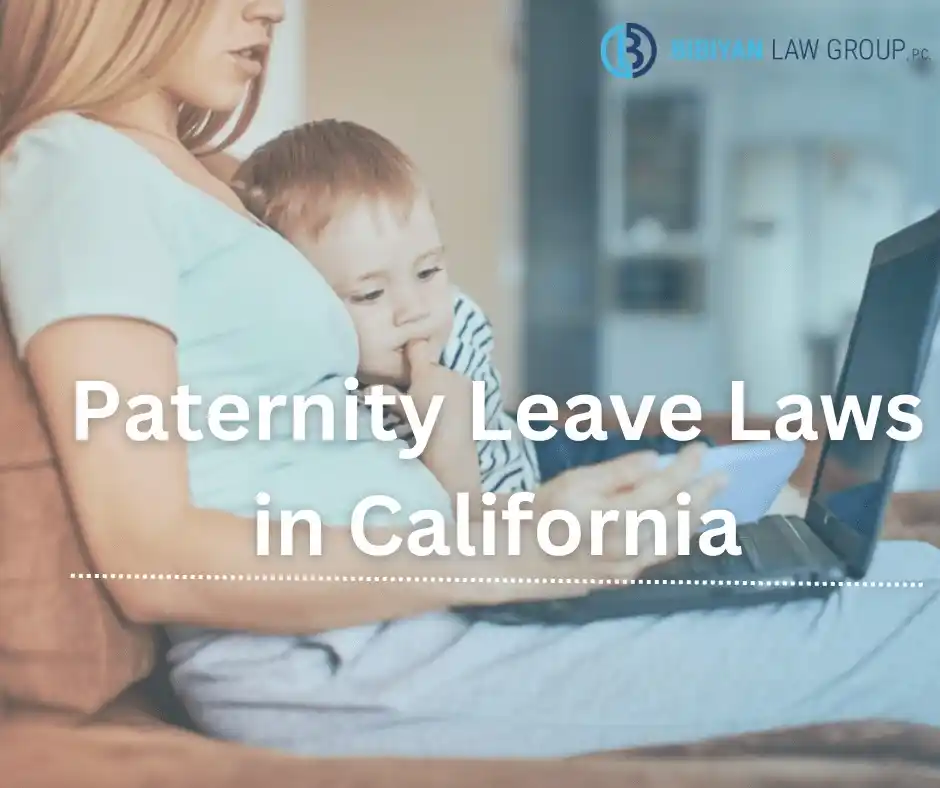California paternity leave laws support new fathers. If you’re a father-to-be or have recently become a dad in the Golden State, it is essential to understand these laws and the protections they offer during your child’s crucial early weeks and months. Comprehending the difference between paid vs. unpaid leave, recognizing employer violations, and being well-informed about legal processes are essential to safeguarding your right to bond with your child. Contact us today to speak with an employment attorney!
What are the Basics of California Paternity Leave Laws?

California paternity leave laws allow fathers to take time off work to spend time with a new child. Legislation regulating paternity leave in California includes the California Family Rights Act (CFRA), applicable to employers with five or more employees, and the Family and Medical Leave Act (FMLA), applicable to employers with 50 or more employees. These acts allow eligible employees up to 12 weeks of unpaid, job-protected leave within one year of the child’s birth, adoption, or foster-care placement. Eligible employees must have worked for a covered employer for at least 12 months and must have worked for 1,250 hours in the 12 months before the start of the leave.
What is Paid vs. Unpaid Paternity Leave?
When it comes to paternity leave laws for California employees, a key distinction is the difference between paid and unpaid leave. While the FMLA/CFRA mandates up to 12 weeks of job-protected leave, they do not require employers to pay the employee during that time. However, depending on the circumstances, fathers can apply for California’s Paid Family Leave (PFL) program through the California Employment Development Department, which is a state disability insurance program that provides up to 60-70% of an employee’s wages for a maximum of eight weeks, contingent on their income level.
How Do Employers Violate Work Paternity Leave Laws in California?
California legally obligates employers to comply with paternity leave laws. Violating them can have serious consequences for employers, including legal penalties. The following are common violations to be aware of:
- Illegally denying leave. Employers cannot legally deny eligible employees the right to take paternity leave.
Retaliation for employee requests. It is illegal for employers to retaliate against employees for requesting or taking paternity leave. This includes actions like demotion, termination, or harassment. - Failure to maintain benefits. Employers must maintain an employee’s health benefits during paternity leave as if they were actively working.
- Improper documentation. Employers may require employees to provide reasonable notice and documentation when requesting paternity leave. However, they must not demand excessive or unnecessary documentation.
- Failure to reinstate employees to equivalent positions. Upon an employee’s return, employers must reinstate employees to the same position they held before leaving.
Consulting an employment law attorney can help you determine if your employer violated your rights and assist you in devising a game plan based on your case’s circumstances.
What Do I Do If My Employer Violated My Paternity Leave Rights?
If you believe that your employer has violated your paternity leave rights, it is essential to take the following steps:
- Document everything. Keep records of any communication with your employer regarding paternity leave, including emails, texts, and written correspondence.
- Contact HR or your supervisor. If you encounter issues related to paternity leave and feel comfortable doing so, speak with someone internally about the problem who may be able to resolve the issue first.
- Consult an attorney. An employment attorney can provide legal guidance and help you determine whether filing a lawsuit against your employer is appropriate.
- File a complaint. If internal resolution attempts fail, you and your attorney can file a complaint with California’s Civil Rights Department (CRD). The CRD can investigate claims, mediate disputes, and file lawsuits against employers.
- Contact the EDD. If you have issues related to the Paid Family Leave (PFL) program or believe your employer wrongfully denied you benefits, you or your attorney can contact the California Employment Development Department (EDD) for assistance.
Because California imposes statutory deadlines, filing your complaint promptly to safeguard your claim is essential. Consulting an experienced employment law attorney who can help you explore all available legal options first will ensure you meet all applicable deadlines.
Bibiyan Law Group, P.C., Your Employment Law Advocates
Bibiyan Law Group, P.C., specializes exclusively in employment law. With a team of nearly 20 skilled attorneys backed by a support staff of 40, we bring years of focused experience to the table. Our team prides itself on giving each case the personalized attention it deserves, treating every client as a valued, unique individual. If you are dealing with paternity leave issues, reach out to us. We can assess the problem, protect your rights, and seek justice. Our firm’s hard-hitting, results-oriented approach has led to the recovery of tens of millions of dollars for employees subjected to unjust employment practices. Get in touch with us today to learn how we can assist you.


